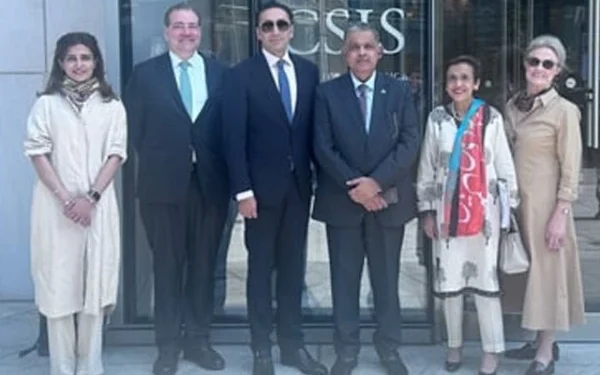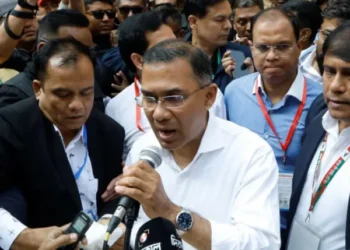Introduction: Key Statement from PPP Chairman
New York — In a strong condemnation of recent developments in South Asia, Pakistan Peoples Party (PPP) Chairman Bilawal Bhutto Zardari termed the suspension of the Indus Water Treaty (IWT) as a “serious violation of international law.” Speaking during his high-profile visit to the United States, Bilawal emphasized that lasting peace in South Asia cannot be achieved through conflict or war but must come through sincere negotiations and diplomacy.
Background: The Indus Water Treaty and Its Importance
The Indus Water Treaty, signed in 1960 between India and Pakistan under the auspices of the World Bank, is a pivotal agreement governing the use of the Indus River and its tributaries shared between the two countries. Despite decades of conflict and wars, the treaty has remained largely intact, acting as a rare symbol of cooperation in the often tense India-Pakistan relationship.
The suspension or violation of this treaty threatens not only bilateral relations but also water security for millions of people in both countries. The treaty’s suspension signals a potential escalation of hostilities, with wide-reaching consequences for regional stability and international law.
Bilawal Bhutto’s Message to US Lawmakers and Think Tanks
Bilawal Bhutto Zardari is currently part of a high-level Pakistani delegation visiting Washington, D.C., aimed at strengthening diplomatic ties and advocating for peaceful solutions to South Asia’s challenges.
Meetings with US Congress Members
During his visit, Bilawal held a significant meeting with members of the Pakistani Caucus in the US Congress, where he discussed critical issues including regional security, counterterrorism efforts, and Pakistan-India relations.
The meeting took place at the Cannon House Office Building and was hosted by Congressman Tom Suozzi, a Democrat from New York. Present were influential lawmakers such as Republican Jack Bergman and Democratic Congresswoman Ilhan Omar, highlighting bipartisan concern about the region’s stability.
Bilawal proposed the formation of a Pakistan-India Joint Counter-Terrorism Forum to address rising threats collectively. He stressed that cooperation on security issues is crucial for reducing violence and promoting mutual trust.
Advocating Diplomacy Over Conflict
At a panel discussion hosted by the renowned Center for Strategic and International Studies (CSIS) in Washington, Bilawal reiterated Pakistan’s stance that diplomacy is the only viable path to peace in South Asia.
He called on the international community, especially influential stakeholders like the United States, to intensify diplomatic efforts to resolve geopolitical and security challenges in the region. Bilawal stressed that dialogue, not military confrontation, is essential to preventing further escalation.
Economic Benefits of Peace and Trade
Speaking at the Americans for Tax Reform event, Bilawal highlighted that opening trade routes and economic cooperation between India and Pakistan could significantly reduce conflicts. He argued that increased trade not only fosters goodwill but also saves billions of dollars for taxpayers by lowering military expenditures and mitigating conflict-related costs.
This economic perspective on peacebuilding is critical, especially in a region where hostilities have hindered economic growth and development for decades.
Acknowledging US Support for Ceasefire
Bilawal also expressed gratitude towards former US President Donald Trump for his role in facilitating a ceasefire between Pakistan and India. He acknowledged that international diplomatic interventions have contributed positively to maintaining calm along the Line of Control (LoC), which divides the disputed Kashmir region.
Media Engagement and Pakistan’s Position
Throughout his visit, Bilawal Bhutto Zardari engaged extensively with American media, giving interviews to several TV channels. In these discussions, he articulated Pakistan’s position on multiple issues:
- The ongoing situation in Afghanistan, emphasizing Pakistan’s support for peace and stability in the war-torn country.
- The importance of reviving Pakistan-India peace talks to ease tensions and promote regional development.
- The broader vision for peace in South Asia through sustained dialogue and mutual respect.
Bilawal underscored the lessons learned from decades of conflict, emphasizing that “what cannot be achieved with guns can be accomplished through talks.”
The Larger Regional Context: Security and Terrorism
Pakistan and India have a long history of disputes, most notably over Kashmir. Terrorism and cross-border violence have been central issues complicating peace efforts.
Bilawal’s call for a joint counter-terrorism forum represents a strategic attempt to address shared security challenges collaboratively, which could pave the way for improved relations.
Furthermore, Pakistan has been under international scrutiny for its role in regional terrorism. Bilawal’s engagements in the US aim to convey Pakistan’s commitment to fighting terrorism and promoting peace.
International Law and the Suspension of the Indus Water Treaty
The Indus Water Treaty is considered a cornerstone of international water law and a benchmark for conflict resolution through legal frameworks. Pakistan’s position that the treaty’s suspension by India constitutes a “serious violation of international law” is grounded in the understanding that such agreements ensure equitable resource sharing, preventing conflict escalation.
If the treaty is undermined, it not only threatens water access for millions but also risks destabilizing the fragile peace that the treaty has helped maintain over six decades.
Conclusion: The Way Forward
Bilawal Bhutto Zardari’s visit to the US reflects Pakistan’s ongoing efforts to seek diplomatic avenues for peace and stability in South Asia. His statements reaffirm that dialogue, economic cooperation, and joint security mechanisms are crucial tools for transforming a historically contentious relationship.
The suspension of the Indus Water Treaty is a warning sign that the region’s peace remains fragile. However, with international support and renewed commitment to diplomacy, there is hope that lasting peace and cooperation between India and Pakistan can be achieved.

























